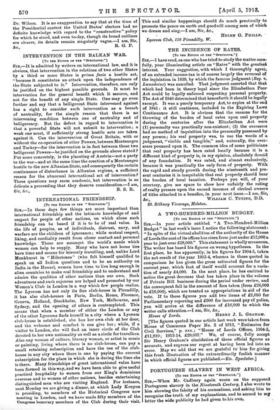INTERVENTION IN THE BALKAN WAR.
[TO THE EDITOR OF THE "SPECTATOR."]
SIR,—It is admitted by writers on international law, and it is obvious, that intervention in the relations of two other States by a third or more States is prima facie a hostile act, "because it constitutes an attack upon the independence of the State subjected to it." Intervention, therefore, can only be justified on the highest possible grounds. It must be intervention for the general benefit which it secures, and not for the benefit of any single State. One may go even further and say that a belligerent State intervened against has a right to consider such intervention as a breach of neutrality, for the simple reason that there is no intervening condition between one of neutrality and of belligerency. But the defect in regard to intervention is that a powerful State will not submit to intervention ; a weak one must, if sufficiently strong hostile acts are taken against it. Can the intervention of Great Britain, with or without the co-operation of other Powers, between Montenegro and Turkey—for the intervention is in fact between these two belligerent Powers—be justified on the grounds above stated? Put more concretely, is the placating of Austria—not a party to the war—and at the same time the creation of a Montenegro hostile to the new Albanian State, and consequently the certain continuance of disturbance in Albanian regions, a sufficient reason for the abnormal international act of intervention ? These questions may seem academic, but intervention is so delicate a proceeding that they deserve consideration.—I am,














































 Previous page
Previous page